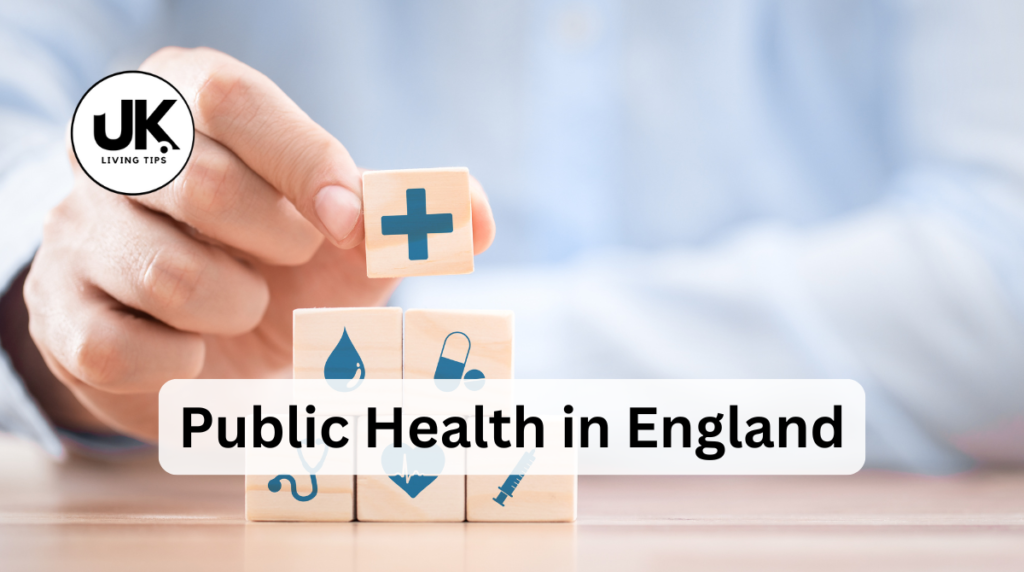Public Health in England
Moving to a new country always involves adjusting to a different system, and understanding healthcare is a key part of settling in. This guide focuses on public health in England, which is different from individual healthcare provided by the NHS (National Health Service). Public health is about keeping the whole population healthy, preventing illness, and protecting us from threats.
READ ALSO: A Complete Guide to Childcare Options for Expats in the UK in 2024/2025
Overview
What is Public Health in England?
Public health isn’t about seeing a doctor when you’re sick; it’s about preventing illness in the first place. It’s about making sure the environment you live in is safe and healthy, and that everyone has access to information and resources to live well. This includes things like:
- Preventing the spread of infectious diseases involves vaccination programs, monitoring outbreaks (like flu or COVID-19), and ensuring safe food and water supplies. The UK Health Security Agency (UKHSA) is responsible for this.
- Promoting healthy lifestyles: This means encouraging healthy eating, regular exercise, and not smoking. You’ll find information and resources on the NHS website, including advice on diet, exercise, and quitting smoking.
- Tackling health inequalities: Public health works to address differences in health outcomes between different groups of people, based on factors like income, ethnicity, and location. This means trying to make sure everyone has the same opportunities to be healthy, regardless of their background.
- Protecting the environment: This involves improving air quality, ensuring safe housing, and promoting access to green spaces. Local councils play a big role here.
Who’s Responsible?
Several organizations share responsibility for public health in England:
- The Department of Health and Social Care (DHSC): This government department sets the overall strategy and policy.
- UKHSA: They focus on protecting against infectious diseases and managing health emergencies.
- NHS England: While primarily focused on providing healthcare, NHS England contributes to public health initiatives.
- Local Councils: Your local council is responsible for many public health services in your area. They will have their own website with information on local services and initiatives.
How Does it Affect Me?
Public health initiatives affect you in many ways:
- Vaccination programs: You’ll be offered vaccinations against various diseases.
- Health information campaigns: You’ll see public health messages about healthy living in various media.
- Local health services: Your local council may offer health checks, support groups, or other programs.
- Environmental improvements: Your local council works to improve the cleanliness and safety of your environment.
Where to Find More Information:
- NHS Website:– This is a great starting point for health information and services.
- Your Local Council Website: Search online for “[your town/city] council” to find your local council’s website.
- UKHSA Website:– For information on infectious diseases and health protection.
Understanding public health in England will help you make informed choices about your health and wellbeing, and access resources available to you. Remember to check your local council’s website for specific services and programs available in your
Key Areas of Focus:
Public health in England addresses a wide range of issues, including:
- Infectious Disease Control: Managing outbreaks, vaccination programs, and surveillance of infectious diseases remain critical priorities. UKHSA plays a leading role here.
- Chronic Disease Prevention: Tackling conditions like heart disease, cancer, and diabetes through lifestyle interventions, screening programs, and public awareness campaigns is a major focus. [https://www.nhs.uk/live-well/] offers resources on various chronic disease prevention strategies.
- Mental Health: Improving mental wellbeing across the population is a significant challenge, with initiatives targeting various age groups and focusing on early intervention and access to support services. [https://www.nhs.uk/mental-health/] provides information and resources for mental health support.
- Health Inequalities: Addressing disparities in health outcomes based on factors like socioeconomic status, ethnicity, and geography is a central aim. Reducing health inequalities requires tackling wider societal issues.
- Health Promotion: Encouraging healthy lifestyles through campaigns promoting physical activity, healthy eating, and responsible alcohol consumption are crucial elements. [https://www.gov.uk/government/publications/health-matters-tackling-obesity] offers insight into government strategies for obesity prevention, for instance.
- Environmental Health: Addressing the impact of the environment on health, including air quality, housing conditions, and access to green spaces, is increasingly important.
Challenges and Future Directions:
Public health in England faces numerous challenges:
- Funding: Securing adequate funding for public health programs remains a constant struggle.
- Health Inequalities: Persistent disparities in health outcomes across different populations present a significant hurdle.
- Emerging Threats: New and re-emerging infectious diseases, alongside the challenges of antimicrobial resistance, require ongoing vigilance and adaptation.
- Resource Allocation: Effectively allocating resources to address competing priorities is a continuous challenge.
The future of public health in England will likely involve increased focus on data-driven approaches, personalized interventions, and stronger collaboration between different sectors. Addressing the social determinants of health, such as poverty and inequality, will be vital for achieving sustainable improvements in population health.
This article provides a general overview. For more detailed information on specific aspects of public health in England, please refer to the websites linked above and the resources available from individual local authorities and NHS organizations.
Conclusion
England’s new government has made public health a priority, but the current system isn’t equipped to handle this ambition. It faces significant hurdles: a fragmented structure, unclear leadership, a lack of political independence, and poor coordination with other government departments.
The government now needs to decide how best to address these problems. One option is creating a new public health agency to oversee both health improvement and protection at national and regional levels. However, a less drastic approach might suffice – potentially boosting funding for the existing system and improving cross-government collaboration.
Simply increasing funding might not be enough for long-term success. Without structural changes, public health could easily be sidelined again in the future. This is a crucial moment for the government to create a robust and resilient system capable of tackling the nation’s long-term health challenges.
A key element of any improved system is a well-staffed public health workforce. A dedicated national workforce plan is urgently needed, alongside the existing NHS workforce plan.
While current health reforms focus on the NHS, the government must also address the issues within the public health system. We’ve outlined potential solutions, the risks of inaction, and the critical decisions that need to be made.



